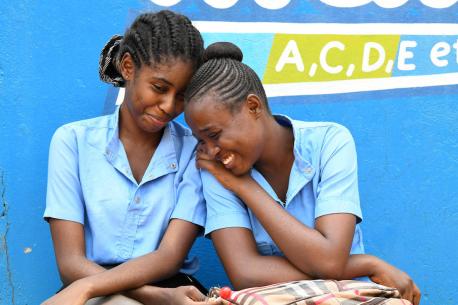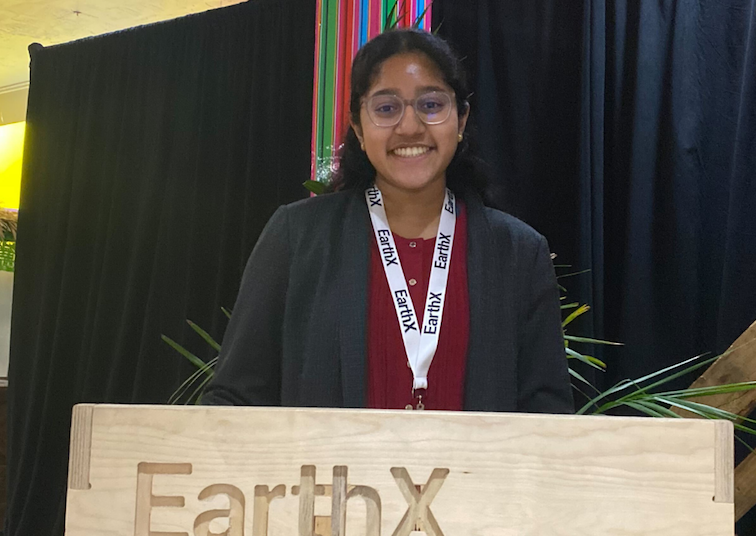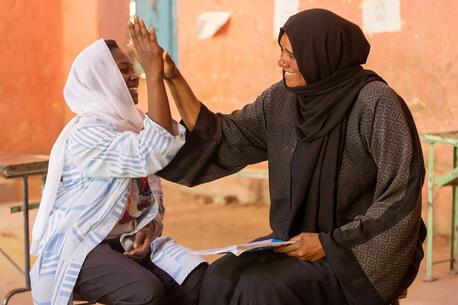
Access to Mental Health Care Saves Young Lives
It's time to reduce stigma, promote self-care and help those in need access quality mental health care and resources.
This Mental Health Awareness Month, UNICEF USA is amplifying the voices of youth mental health advocates from around the country to stop the stigma and spread the message that #MentalHealthMatters. If you'd like to take action, join us in asking Congress to strengthen mental health and psychosocial support programming in U.S. foreign assistance by passing the MINDS Act. For those who are struggling, there are resources listed at the bottom of the page.
The author, Kripa, is a high school senior from Texas.
Young people need access to quality mental health care
Suicide is the third leading cause of death among youth between 15 and 19, after accidents and homicide, according to the Centers for Disease Control and Prevention. The link between suicide and mental disorders — particularly depression and alcohol abuse — is well established in high-income countries. Every year, the world loses an estimated 700,000 people to suicide, along with the contributions they might have made if they had received the mental health care and support they urgently needed.
Due to stigma and the lack of access to proper mental health care in the U.S. and globally, countless students shy away from seeking help. In many schools nationwide, counselors provide mental health support. But how can students be comfortable expressing their mental health concerns to the same adults who write their college recommendation letters? Even when therapy and resources are available outside of school, the high cost is a deterrent for many young people.
Peer support programs reduce stigma
To combat this, our school started a chapter of Hope Squad, a peer-to-peer suicide prevention program. Hope Squad aims to reduce youth suicide through education, training and peer intervention.
I was nominated to be a founding member of my school's chapter and my work began on Zoom during the pandemic. Through Hope Squad, I helped make hundreds of yellow ribbons, drew motivational messages with chalk, distributed fidget toys and stickers, and created resources with hotline information to reduce student anxiety throughout the year, especially during testing and finals time, when anxiety and stress are at an all-time high. Through these activities, we hoped to reduce stigma around mental health, promote self-care, raise awareness about mental health resources and normalize mental health discussions.
As a mental health advocate, being an active UNICEF supporter — both in the Clubs program and on the National Youth Council — has allowed me to amplify my efforts. From sharing my family members' and friends' battles with mental health issues to advance the MINDS Act during Advocacy Week and August Recess to organizing fundraisers for better mental health resources with other members of the UNICEF Club, the opportunities have been truly endless.

UNICEF USA advocates for better mental health care in the U.S. and around the world
You can take action too, with UNICEF and other organizations. If you are looking for places to start, the UNICEF USA Action Center details mental health advocacy actions, including encouraging Congress to invest in the mental health and well-being of children and adolescents in the U.S., and spreading awareness about the MINDS Act.
Let's bring the statistic of losing more than 700,000 brilliant minds every year down to zero. By helping our peers overcome their mental health struggles and improving access to youth-friendly mental health services, perhaps we can save the next Albert Einstein, the next Marie Curie, the next Rosa Parks.
Be the helper, not the bystander
This cause is bigger than me or you. It's bigger than all of us: 50 percent of U.S. youth experience mental health challenges. Poor mental health is a hidden epidemic and it's time we shed some light on the issue.
We need to create a safe space to discuss mental health in every community, county, state, country. We need to ensure that everyone — especially youth — has access to mental health services and feels comfortable reaching out to teachers, staff, administration and peers.
Maybe we can be that one person who saves someone's life and the advocates that can help change the system and break the stigma.
P.S. If you are struggling with mental health, know you are enough and you are not alone. Reach out to a family member or trusted peer and express how you feel — never bottle it up.
The National Alliance on Mental Illness (NAMI) HelpLine is a free, nationwide peer-support service providing information, resource referrals and support to people living with a mental health condition, their family members and caregivers, mental health providers and the public. HelpLine staff and volunteers are experienced, well-trained and able to provide guidance. The NAMI HelpLine is not a hotline, crisis line or suicide prevention line.
The NAMI HelpLine can be reached Monday through Friday, 10 a.m. — 10 p.m. EST. Call 1-800-950-NAMI (6264), text "HelpLine" to 62640 or email NAMI at helpline@nami.org.
If you or someone you know is having thoughts of suicide or experiencing a mental health crisis, trained crisis counselors are available 24 hours a day, 7 days a week at the 988 Suicide & Crisis Lifeline: dial or text 988. Crisis counselors listen empathetically and without judgment. Your crisis counselor will work to ensure that you feel save and help identify options and information about mental health services in your area.


